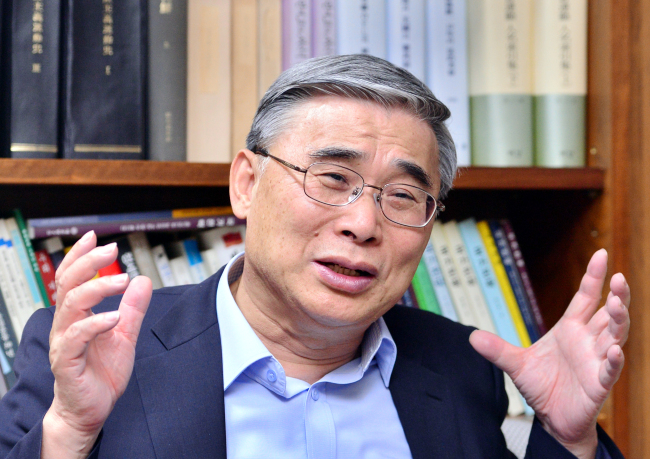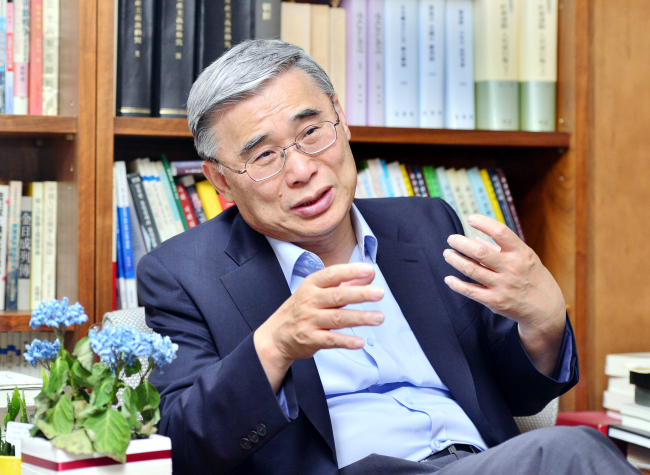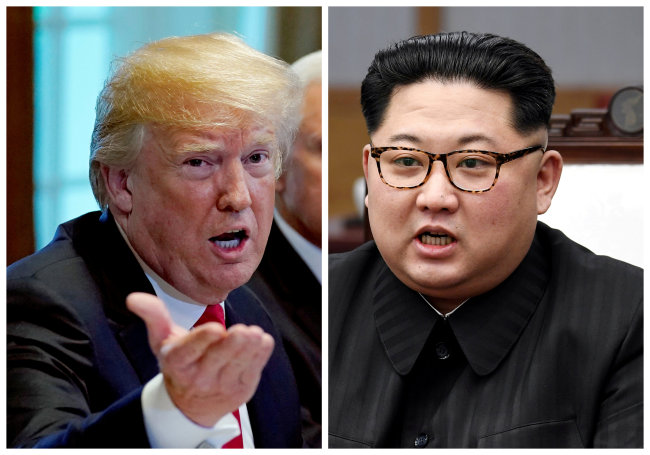[US-NK Summit] 'For Kim Jong-un to cheat, risk is too high'
Former Unification Minister Lee Jong-seok says North Korea is now more sincere about denuclearization on Kim’s eagerness to improve economy
By Yeo Jun-sukPublished : June 6, 2018 - 16:02
Previous attempts to denuclearize North Korea have ended with failure. From the Agreed Framework in 1994 and Leap Day deal of 2012, the past negotiations were bedeviled by mistrust and eventually allowed Pyongyang to declare itself a full-fledged nuclear power.
Such skepticism is still rampant over the first-ever US-North Korea summit to be held in Singapore on Tuesday. Despite the historic significance, doubts persist over whether North Korea would give away the nuclear weapons that it sees as an ultimate guarantor of the regime’s survival.
But Lee Jong-seok, who oversaw inter-Korean relations during the Roh Moo-hyun administration, begged to differ, arguing that Kim Jong-un’s commitment to denuclearization appears to be more sincere than that of his predecessors.
“If Kim just tries to deceive without any denuclearization commitment, he is playing a really dangerous game,” Lee, who now advises President Moon Jae-in on inter-Korean relations, told the Korea Herald on Tuesday
“It would create enormous backlash and I don’t think Kim would get away with it. If it is just a fraud, Kim would have left some holes for escape. But it doesn’t seem like there are such holes,” said Lee during an interview at his office in Sejong Institute, a think tank based in Korea.

Lee suspected that Kim has taken a series of steps to make his denuclearization pledge irreversible, and such a message was being delivered not only to the concerned countries but to a domestic audience as well.
On April 20, the North Korean leader proclaimed the country had adopted a “new strategic line” that solely focuses on developing the economy -- a pivot away from the simultaneous pursuit of nuclear weapons and economic growth, known as Byungjin line.
The announcement was followed by a series of unprecedented meetings with foreign leaders and their surrogates, where Kim reaffirmed his commitment to denuclearization, and the eventual shutdown of the reclusive country’s only known nuclear test sites last month.
“It’s important to note Kim took these measures pre-emptively. He delivered a denuclearization commitment not just to President Moon, but to US Secretary of State Mike Pompeo, Chinese leader Xi Jinping and Russian Foreign Minister Sergey Lavrov,” Lee said.
“I’m not saying Kim is a nice leader with a good heart. If he was forced to do something on denuclearization just to cheat someone, he is really playing a dangerous game and I don’t think he is doing that.”
The reason for Kim’s sincere attitude toward denuclearization could be his eagerness to transform his impoverished country into an “economic powerhouse” -- a result that can only be obtained by the lifting of economic sanctions in exchange for the surrender of its nuclear arsenal, Lee noted.
Kim has outlined such a plan since taking office in late 2011. According to the Korea Trade-Investment Promotion Agency, North Korea set up 22 Economic Development Zones in 2013 and 2014, in addition to the existing five Special Economic Zones.
Such efforts were most vividly seen at a massive tourism project at the eastern coastal city of Wonsan. North Korea held a massive rally -- attended by newly appointed top military brass -- to declare that the Wonsan-Kalma Coastal Tourist Area would be completed by next April.
“Kim Jong-un has instructed his people to complete the tourism zone by his father’s birthday on April 20 next year. An enormous amount of money and people are being spent to build the tourism site, whose size is equivalent to several newly developed cities in South Korea,” said Lee.
“But under the current economic sanctions, those resources would go to waste. In order to achieve the goal, they need to have economic sanctions lifted, and the only way to see this happening is denuclearization.”

While it is hard to predict the outcome of the US-North Korea summit, Lee said the key to its success lies in encouraging North Korea to keep its course: sticking to the denuclearization pledge and moving toward reforming the country.
In order to achieve the goal, the Trump administration should understand the security dilemma faced by North Korea in surrendering its nuclear arsenal to the country that once threated to unleash “fire and fury” on it, he added.
For that reason, setting the threshold for the summit too high can send a “bad signal” to North Korea, prompting Kim to doubt the US’ motives and leading him to recede back inside the reclusive country, Lee noted.
“For Kim Jong-un, the fear of abandoning nuclear weapons can be much bigger than we think. First, it is about changing their way of life entirely. Second, only their archenemy can compensate them for surrendering the weapons.”
“Kim Jong-un has a vision of the country he wants to build. What we should do is to encourage him to follow his dream, not to scare him away. I don’t think it takes too much effort to put ourselves in Kim Jong-un’s shoes.”
Faced with the concern that the Trump-Kim summit might end up being a “getting-to-know-you” meeting without significant process of denuclearization, the White House said Monday its “powerful sanctions” remain in place until North Korea completely abandons its nuclear weapons.
On the same day, the Senate’s top democrats cautioned they would not support lifting sanctions unless North Korea meets basic principles for denuclearization, including “anywhere, anytime inspections” of declared and nondeclared nuclear sites.
But Lee said random inspections could be too harsh for North Korea to accept -- particularly as an initial step for a denuclearization agreement that might come out of the Trump-Kim summit.
“Random inspections are like a measure imposed on countries defeated at war. Even if the US and North Korea agreed to normalize relations and end hostilities, North Korea is a still sovereign country and it will not agree to undermining its right.”
“What we should do is try to find realistic ways to inspect North Korea’s nuclear facilities as much as possible. I think Kim Jong-un can be flexible on the scope of special inspections and expand it depending upon negotiations.”

Measures that North Korea can agree to implement immediately, Lee suggested, are declaring a list of nuclear weapons and intercontinental ballistic missiles and shipping them out of the country by the end of this year.
In return, the US would compensate the North with “irreversible measures” in the form of security, political and economic guarantees -- such as declaring an official end to the Korean War, establishing diplomatic ties and the lifting of economic sanctions.
Once both sides accomplish these initial steps, Lee added, they can move onto the second, final phase. For North Korea, it should accept verification of its nuclear weapons and ICBMs as well as their production facilities, while the US pursues signing a peace treaty and offering economic compensation.
“My so-called ‘two-phase approach’ is still a theoretical concept. We all want to reach the deal in a comprehensive manner, but it won’t be easy to agree on denuclearization and a security guarantee with just one deal,” Lee said.
“What is important is that Trump and Kim agree on the need for denuclearization and a security guarantee and come up with the measures to implement them. If we can see such results, we can say the summit was fruitful.”
The minister noted if Kim Jong-un decides to open up the country, its economy can grow faster than other less-developed, socialist countries based on its skilled workforce, mineral resources and geo-economic benefits.
When asked about whether the reclusive regime would accept foreign investment for economic development, Lee said there is incentive for Kim Jong-un to open up his country as he saw similar successes from neighboring one-party communist states -- such as China and Vietnam.
Given that there are early signs of market capitalism in North Korea and the emergence of a middle-class, the country might have a better starting point than those socialist countries embracing capitalism decades ago, he added.
“Combined with foreign investment and technology, I think North Korea can create great synergy effects. I think North Korea can achieve economic growth of 10 to 20 percent over the 10 to 20 years,” Lee said.
“Of course, Kim Jong-has some issues to be addressed. For example, North Korea’s communist party lacks diversity, compared to those of China and Vietnam. If Kim overcomes this, I think there can be better future for North Korea.”
(jasonyeo@heraldcorp.com)







![[KH Explains] How should Korea adjust its trade defenses against Chinese EVs?](http://res.heraldm.com/phpwas/restmb_idxmake.php?idx=644&simg=/content/image/2024/04/15/20240415050562_0.jpg&u=20240415144419)










![[Today’s K-pop] Stray Kids to return soon: report](http://res.heraldm.com/phpwas/restmb_idxmake.php?idx=642&simg=/content/image/2024/04/16/20240416050713_0.jpg&u=)